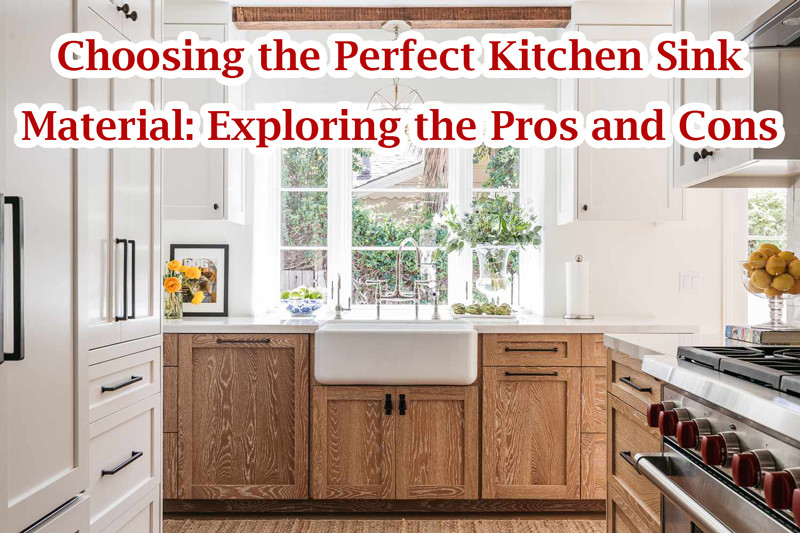
The kitchen sink is undeniably one of the most utilized fixtures in any home. It’s where you wash dishes, prepare food, and even clean your hands. With such frequent use, selecting the right material for your kitchen sink is crucial. There’s a myriad of options available, each with its own set of pros and cons. Let’s delve into some of the best and worst kitchen sink materials to help you make an informed decision for your home.
Stainless Steel
Pros:
- Durability: Stainless steel sinks are incredibly durable and resistant to stains, heat, and corrosion. They can withstand heavy daily use without showing signs of wear and tear.
- Affordability: Compared to other materials, stainless steel sinks are relatively affordable, making them a popular choice for many homeowners.
- Easy Maintenance: These sinks are a breeze to clean and maintain. They don’t require any special cleaning agents and can be wiped down with a cloth and mild detergent.
- Versatility: Stainless steel sinks come in various shapes, sizes, and configurations, allowing you to find the perfect fit for your kitchen.
Cons:
- Prone to Scratches: While durable, stainless steel sinks can be prone to scratches and dents, especially if you’re not careful with heavy cookware or sharp utensils.
- Can Be Noisy: Without proper insulation, stainless steel sinks can be quite noisy when water hits the surface or when dishes are being washed.
Cast Iron
Pros:
- Classic Appearance: Cast iron sinks have a timeless, classic look that can add a touch of elegance to any kitchen.
- Heat Resistance: These sinks are highly resistant to heat, making them ideal for placing hot pots and pans directly into the sink without fear of damage.
- Variety of Colors: Cast iron sinks come in a wide range of colors, allowing you to choose a hue that complements your kitchen’s aesthetic.
- Stain Resistance: When properly sealed, cast iron sinks are resistant to stains and easy to clean.
Cons:
- Heavy: Cast iron sinks are incredibly heavy, which can make installation challenging and may require additional support.
- Prone to Chipping: Despite their durability, cast iron sinks can chip if heavy objects are dropped onto them.
- Cost: Cast iron sinks tend to be more expensive than other materials, which may not be ideal for homeowners on a budget.
Composite Granite
Pros:
- Durability: Composite granite sinks are incredibly durable and resistant to scratches, stains, and heat.
- Variety of Colors: Similar to cast iron sinks, composite granite sinks come in a wide range of colors to suit any kitchen design.
- Noise Reduction: These sinks are typically quieter than stainless steel sinks due to their sound-absorbing properties.
- Low Maintenance: Composite granite sinks are easy to clean and require minimal maintenance to keep them looking like new.
Cons:
- Cost: Composite granite sinks can be quite expensive, especially if you opt for a high-end brand or design.
- Weight: Like cast iron sinks, composite granite sinks are heavy and may require additional support during installation.
- Potential for Staining: While resistant to stains, composite granite sinks may still become discolored over time if not properly cared for.
Ceramic
Pros:
- Aesthetic Appeal: Ceramic sinks have a classic, timeless appeal that can enhance the overall look of your kitchen.
- Variety of Styles: These sinks come in a variety of styles, including farmhouse and under-mount, allowing you to choose one that fits your kitchen design perfectly.
- Stain Resistance: Ceramic sinks are resistant to stains and easy to clean, making them ideal for busy kitchens.
Cons:
- Prone to Chips and Cracks: Ceramic sinks can chip or crack if heavy objects are dropped onto them, and once damaged, they can be difficult to repair.
- Limited Color Options: While ceramic sinks do come in various colors, the selection may not be as extensive as other materials.
- High Maintenance: Ceramic sinks require regular cleaning and maintenance to prevent staining and keep them looking their best.
Conclusion
In conclusion, choosing the right kitchen sink material involves considering factors such as durability, maintenance, cost, and aesthetic appeal. While each material has its own set of pros and cons, ultimately, the best choice for your kitchen will depend on your individual needs and preferences. Whether you opt for the affordability of stainless steel, the classic elegance of cast iron, the durability of composite granite, or the timeless appeal of ceramic, investing in a high-quality sink will undoubtedly enhance the functionality and aesthetics of your kitchen for years to come.
 iVIGA Faucet Online Shop
iVIGA Faucet Online Shop
